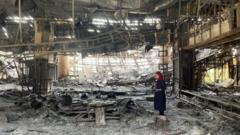The heart of Tehran is gradually pulsing with activity again, though its residents harbor deep fears following a turbulent period marked by conflict. The Boof cafe, located within the historic grounds of the previously closed US embassy, serves as a microcosm of this duality. Amir, the barista, expresses a longing for improved diplomatic relations, stating that U.S. sanctions have significantly impacted daily life and business opportunities for Iranians. At the cafe, a mix of patrons highlights the city's cultural shifts, from conservative dress to more liberal expressions of identity.
In a stark contrast, remarks from Iran's Supreme Leader, Ayatollah Ali Khamenei, broadcasted recently, convey a persistent adversarial stance against the United States, maintaining that foreign influence aims to undermine the Islamic Republic. Following Israel's military actions targeting Iranian facilities, fear runs high as residents question the stability of a tentative ceasefire.
A palpable tension was observed in the Taleghani General hospital, where Ashraf Barghi, the head nurse, described her anxiety about potential new assaults, recalling the severity of injuries treated during the conflict — far more devastating than those witnessed in previous wars. Injured civilians from recent strikes reveal a collective trauma that weighs heavily across Tehran.
Despite these challenges, a semblance of normalcy is emerging: busy roads and open bazaars signal a return of daily life. Yet for many, the weight of grief and uncertainty hangs heavy. Young Iranians, such as Mina, express their despair about the future, reflecting a generation yearning for stability and progress.
During an open-air concert near the iconic Azadi Tower, tensions momentarily eased as diverse groups came together, reaffirming a collective wish for change. Voices of both supporters and critics of the government echoed a demand for greater freedoms, highlighting a growing resolve among citizens to express their concerns.
In this evolving landscape, Tehran's resilience is evident, embodying both a push for peace and an ongoing struggle for self-determination amidst geopolitical tensions.
In a stark contrast, remarks from Iran's Supreme Leader, Ayatollah Ali Khamenei, broadcasted recently, convey a persistent adversarial stance against the United States, maintaining that foreign influence aims to undermine the Islamic Republic. Following Israel's military actions targeting Iranian facilities, fear runs high as residents question the stability of a tentative ceasefire.
A palpable tension was observed in the Taleghani General hospital, where Ashraf Barghi, the head nurse, described her anxiety about potential new assaults, recalling the severity of injuries treated during the conflict — far more devastating than those witnessed in previous wars. Injured civilians from recent strikes reveal a collective trauma that weighs heavily across Tehran.
Despite these challenges, a semblance of normalcy is emerging: busy roads and open bazaars signal a return of daily life. Yet for many, the weight of grief and uncertainty hangs heavy. Young Iranians, such as Mina, express their despair about the future, reflecting a generation yearning for stability and progress.
During an open-air concert near the iconic Azadi Tower, tensions momentarily eased as diverse groups came together, reaffirming a collective wish for change. Voices of both supporters and critics of the government echoed a demand for greater freedoms, highlighting a growing resolve among citizens to express their concerns.
In this evolving landscape, Tehran's resilience is evident, embodying both a push for peace and an ongoing struggle for self-determination amidst geopolitical tensions.

















